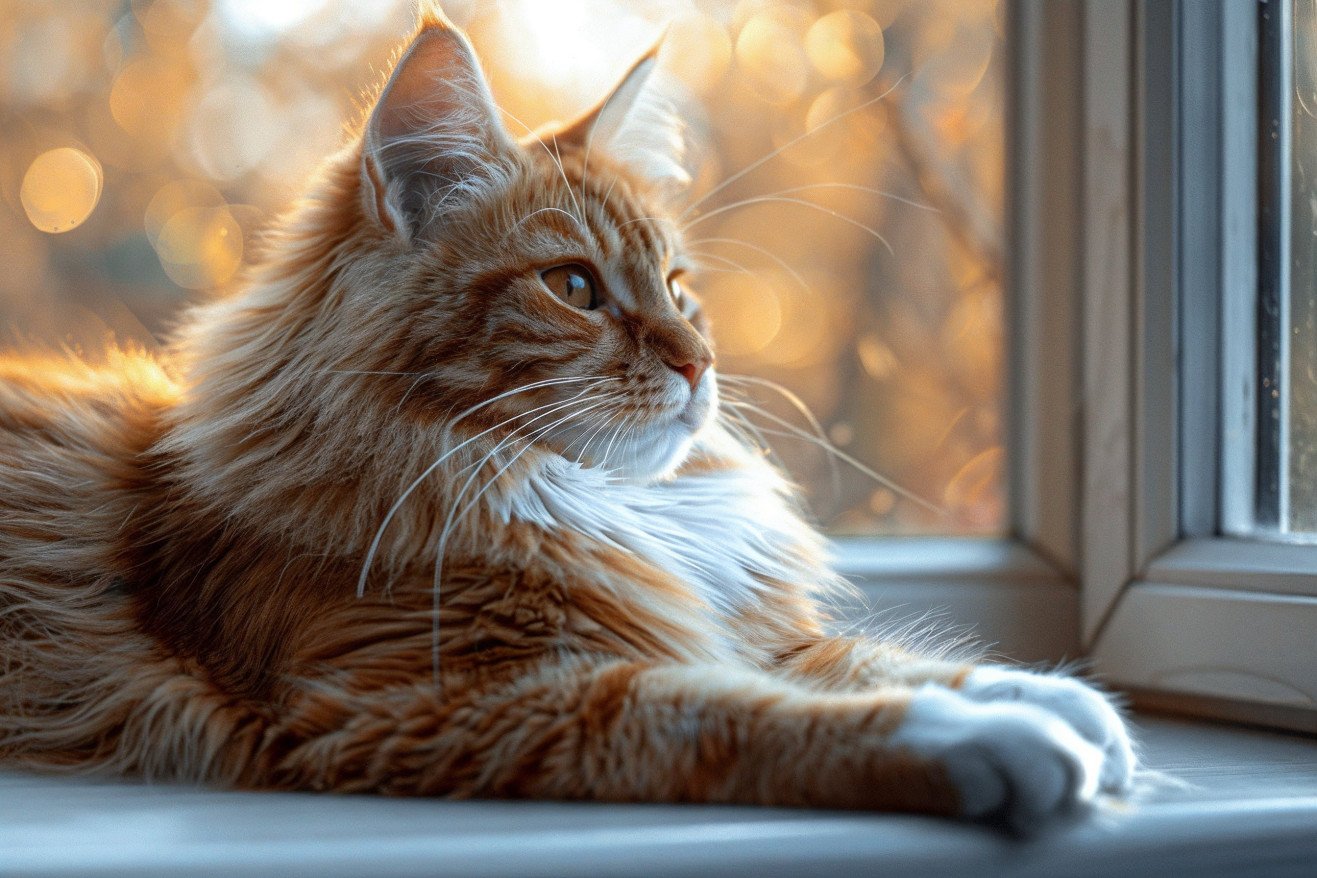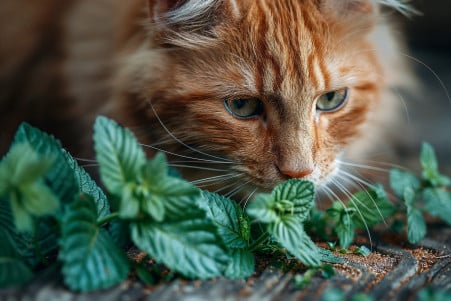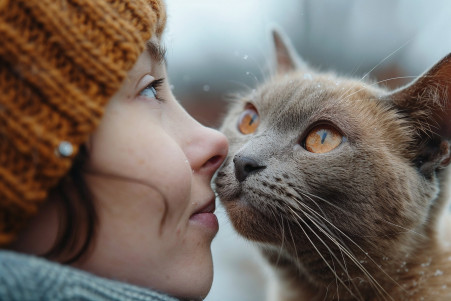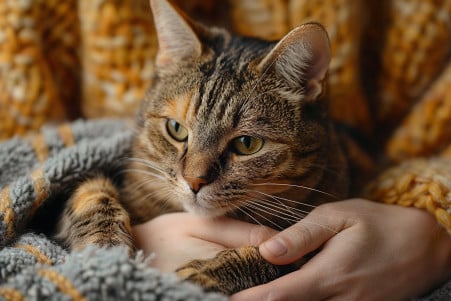Why Do Cats Smell Good? The Science of the Cat Smell
19 April 2024 • Updated 18 April 2024

If you've ever buried your face in your cat's fur and inhaled deeply, you've probably noticed that cats have a unique, fresh, almost buttery smell. But what exactly makes up the scent of a cat? It turns out that cats have pheromones and skin oils that include fatty acids, proteins, and volatile compounds. Together, these make up a cat's scent, which is often described as musky and even as smelling like fresh-baked bread.
While the scent of a cat is due to biological factors, including pheromones and skin oils, new studies in veterinary medicine and animal behavior have shown that a cat's scent is also influenced by grooming, diet, hormones, and the environment. We'll take a look at these studies to find out more about the factors that make up a cat's scent and why some cats may smell better than others. Armed with this information, cat owners can make sure their cats continue to smell as good as they do.
Why do cats smell good?
The Science of Scent: How Cats' Grooming Habits Help
Cats groom themselves for a large portion of the day, between 30-50% of their waking hours, and their tongues are a big part of that. They use their tongues to lick their fur, and the rough texture of their tongues helps to remove dirt, dust, and loose hair. This helps to keep their fur clean and shiny. The spines on a cat's tongue, which are called papillae, face backward and act like a brush. They help to stimulate the production of oils and then spread those oils over the fur and skin.
The number of papillae a cat has can range from about 290 per square centimeter in domestic shorthairs to up to 500 in longhaired breeds like the Maine Coon, and this difference in papillae numbers is one reason that different cat breeds have different grooming needs and fur textures. A cat's constant self-grooming is a big part of why they have a pleasant scent. It helps to keep their fur clean and spreads the oils that help to keep their skin healthy.
When Smells Are a Sign of a Problem: Health-Related Causes of Bad Smells
Although cats usually smell good, there are some health-related reasons why your cat might have an odor. Bad breath can be caused by dental problems like gum disease, cavities, and stomatitis. AmeriVet notes that feline chronic gingivostomatitis, a severe oral inflammation, can lead to bacterial infections that cause bad breath.
Other health-related causes of bad smells in cats include anal gland issues, ear infections, skin infections, and urinary tract infections. The McGill University Office for Science and Society points out that as cats get older, their urine can smell more like ammonia due to the bacterial decomposition of urea.
It’s important to get to the bottom of these health issues if you want to get rid of a cat odor that won’t go away. Sunvet Animal Wellness explains that oral, ear, skin, and urinary tract issues are some of the most common causes of cat odors, and that it’s essential to treat the underlying problems.
The Smell of Success: How Cats Use Pheromones to Communicate
Cats are known to use scent and pheromones to communicate and interact with other cats. A study in Scientific Reports found that the composition of a cat's scent is affected by the bacteria in the anal gland microbiome.
Cats secrete pheromones from different glands on their bodies to mark their territory, attract mates, and warn off competitors. The Comfort Zone website says these pheromones include the feline facial pheromone (FFP) that's used for marking, the cat appeasing pheromone that helps with mother-kitten bonding, and the felinine in cat urine that's involved in marking territory.
Cat Behavior Associates explains that head bunting, scratching, and spraying are all ways that cats leave behind these scent marks. Knowing how cats use scent communication can help you understand more about their behavior and social lives. It can also help you make sure that you're meeting your cat's needs by understanding and respecting these natural scent-based interactions.
How to Keep Your Cat Smelling Fresh
In addition to regular grooming, vacuuming, and cleaning, there are several other ways to keep your cat smelling fresh. Catster explains that increasing the frequency of dusting, sweeping, and vacuuming will help remove debris and the smells that come with it. An air purifier can be used in conjunction with a regular dusting and vacuuming schedule to remove cat smells from a room.
It's also important to stay on top of litter box maintenance, use enzyme cleaners to clean up stains, and wash bedding regularly. Cats.com says that you should scoop the litter box at least twice a day and keep it in a well-ventilated area to help keep odors at bay. When it comes to urine stains and odors, enzyme cleaners are the most effective at removing them. This is because they contain bacteria and enzymes that specifically target and break down the compounds that cause odors.
Feeding your cat a balanced diet, taking them to the vet for regular check-ups, and providing them with daily mental and physical stimulation can also help prevent health issues that cause odors. Love My Catz recommends that you brush and bathe your cat regularly to help keep their coat clean and reduce environmental odors. It's also important to make sure that any medical issues are treated by a vet.
In addition to these tips, using air purifiers, changing HVAC filters every 2-3 months, and using baking soda on carpets can help reduce odors even further, according to Catster. With the right care and a clean living environment, cat parents can help ensure that their feline companion continues to smell fresh and clean.
Diet and a Cat's Natural Scent
Cats are obligate carnivores, so their diet has a big impact on their scent. A study in the Annual Review of Nutrition, explains that domestic cats need diets that are high in protein, certain amino acids like taurine, and fatty acids like arachidonic acid.
However, a study in the Journal of Applied Animal Nutrition found that many commercial dry cat foods are high in carbohydrates, which cats are more likely to reject based on smell and taste. They also found that strong-smelling foods and foods that are high in minerals like calcium can lead to a cat smelling worse.
PetMD notes that bad breath and bad-smelling feces can be a sign that a cat's diet isn't right. A vet can help you figure out if there are dietary issues that are leading to bad smells and can recommend the right food to help your cat maintain their natural scent.
The Purrfect Conclusion: Embracing Your Cat's Natural Aroma
Cats have a distinct, pleasant scent due to a combination of biological factors like pheromones and skin oils. While grooming habits and a healthy diet can help maintain this appealing aroma, medical issues or dietary problems may lead to unpleasant odors.
Understanding a cat's scent communication through pheromones provides insights into their behavior and social dynamics. With proper care, a clean environment, and addressing any underlying health concerns, cat owners can enjoy their feline friends' natural fragrance. Appreciating a cat's unique scent is part of embracing the joys of feline companionship.


